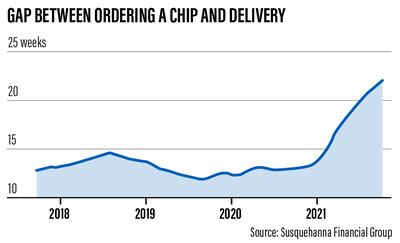The festive season, currently under way in India, is traditionally a time for Indians to splash out on big-ticket purchases, such as a new television, smartphone or even a car.
But this year, despite strong consumer demand following an easing of Covid-19 restrictions, electronics and car companies say their festive cheer has been dampened by the global shortage of semiconductors.
This is holding back production and leading to fewer attractive seasonal discounts offered to consumers.
“The situation is surely not good,” says Ashutosh Verma, founder of electric scooter maker Exalta India, adding that their most popular model is affected. “The vehicle chassis part is ready but we are not able to deliver the vehicle due to a delay in chips.”
The shortage is frustrating because it is affecting production during the festive season “just when consumers are ready and willing to spend”, Mr Verma says.
Semiconductors, also known as chips, are essential components of electronic products such as smartphones, televisions, laptops and vehicles.
But the global crunch on semiconductors is posing a challenge for companies, caused largely by a surge in demand for electronic products during the Covid-19 pandemic.
This comes as India's consumer-driven economy is recovering after it was hit hard by the impact of the pandemic, contracting 7.3 per cent in the past financial year to the end of March. India's economy is forecast to grow 9.5 per cent this year, according to the International Monetary Fund.
With the five-day Diwali festival starting on Tuesday, it is a peak time for Indians to loosen their purse strings for goods, including cars.
However, the shortage of chips has hit carmakers particularly hard. Last year's lockdown restrictions affected the production of cars and led to a decline in orders for semiconductors, which prompted suppliers to divert the components to the electronics sector because of a surge in demand by consumers largely confined to their homes for months.
“Poor inventory planning by equipment manufacturers, chip hoarding by Chinese companies and natural disasters affecting major chip factories further exacerbated the problem,” says Anuj Sethi, a senior director at Crisil Ratings, which is majority owned by S&P Global. “Log jams at ports have also affected shipment of chips this fiscal year.”

India's passenger vehicle sales will be about 400 to 600 basis points lower in the current financial year, from April 2021 to March 2022, compared with the previous corresponding year because of the scarcity of semiconductors, Crisil estimates.
Demand is robust, but there are long waiting lists for several models of cars, which in some cases is as long as nine months.
“Since the pandemic began, preference for personal mobility has increased, leading to more-than-expected demand for passenger vehicles,” Mr Sethi says. “Consumers have also been preferring vehicles with more electronics-driven features, or a higher semiconductor quotient.”
Subsequent production cuts “will have a bearing on the continuing festive season as well when sales are typically higher.”
The scale of the problem is reflected in India's largest carmaker Maruti Suzuki, which last week tempered its expectations for sales and profits in the current financial year.
“We didn’t expect to lose so much production in the second quarter due to chips,” R C Bhargava, Maruti Suzuki's chairman, said during an earnings call after the company posted a 65.3 per cent decline in net profit for the quarter to the end of September.
“What we had expected in terms of volumes and profitability has changed substantially,” he added. “The shortage of semiconductors and electronic components and the increase in the price of components and commodities is on a pretty unprecedented kind of scale.”
In response, the company was forced to cut its production by 60 per cent in September.
Other Indian car manufacturers, including Tata Motors, have warned of the impact of the chip crunch on their businesses.
The effect has also affected hiring trends in the sector, says Indranil Ghosh, vice president and business head at TeamLease Services, a human resources company.
“Hiring sentiment is improving slowly but it is not up to the level [it should be],” he says.
While the car sector is bearing the brunt of the crisis, electronics are also being affected by the shortage.
Smartphone shipments to India declined 2 per cent in the third quarter of this year to 52 million units, according to a report by global research company Counterpoint.
"The quarterly numbers would have been even higher if not for the component shortages that escalated during the quarter,” Prachir Singh, a senior research analyst at Counterpoint, says.
“Consumer demand outweighed the supply due to the high pent-up demand. Keeping in mind the global component shortage, most of the brands were aggressively working to secure enough stock for the festive season.”
Prices of electronic goods, including mobile phones, laptops and televisions, have also jumped as a result of the chip shortage and it is becoming more challenging for companies to launch the usual deep festive discounts without hitting their bottom line, manufacturers say.
“After the car industry, the television industry has been worst hit by the global semiconductor shortage,” says Pallavi Singh, vice president at SPPL, India's largest manufacturer of televisions.
The company has managed to avoid too “much impact” on its business because it had a backlog of stock, but the situation will not "improve in the near future", Ms Singh says.

The semiconductor shortages will continue well into next year, many analysts say.
“One should look at creating an ecosystem that can sustain itself in case of such events in the future,” says Ms Singh.
Like many other electronics manufacturers, SPPL is largely dependent on semiconductors from Taiwan, Ms Singh adds.
“India has limited semiconductor fabrication facilities and these are run by the government of India and cater mainly to defence and space agencies of the government of India,” says Hemant Mallapur, co-founder and executive vice president of engineering at Saankhya Labs, a Bangalore-based semiconductor start-up that designs chips.
“The main reason for the low number of fabrication facilities is the enormous amount of investment to the tunes of billions of dollars that is required to set up a plant.”
The Indian government, however, recently unveiled what its describes as “a scheme for promotion of manufacturing of electronic components and semiconductors”, which includes financial incentives to set up semiconductor plants in India, as it looks to ease the supply disruptions.
founder of electric scooter maker Exalta India
“This scheme is expected to give a boost in semiconductor manufacturing in the country,” Mr Mallapur says.
“Semiconductors are the backbone of many industries,” he says. “The current global semiconductor market is highly centralised with the majority of production being done in Taiwan.”
This leaves the global supply chain highly vulnerable to any disruptions, he adds.
“To mitigate such risks it is important for India to start local fabrication of semiconductors.”
However, manufacturers are worried about the impact of a prolonged shortage of chips on their sales beyond Diwali.
“We need to look for ways to reduce our dependency on other countries to meet this challenge,” Mr Verma of Exalta India says.

